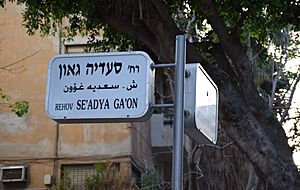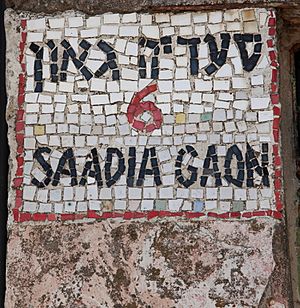Saadia Gaon facts for kids
Quick facts for kids
Sa'adiah ben Yosef Gaon
סעדיה גאון |
|
|---|---|
| Born | c. July 892 |
| Died | May 21, 942 Sura
|
| Era | Medieval philosophy |
| Children | Dosa ben Saadia |
Sa'adiah ben Yosef Gaon (born 882 or 892 – died 942) was a very important rabbi, Gaon (a top Jewish leader), Jewish thinker, and Bible expert. He lived and worked in the Abbasid Caliphate, a large Islamic empire.
Sa'adiah was the first major Jewish leader to write many books in Judeo-Arabic, which was a mix of Hebrew and Arabic. He wrote about the Hebrew language, Halakha (Jewish law), and Jewish philosophy (Jewish ideas). His famous book, The Book of Beliefs and Opinions, was the first time Jewish beliefs were combined with ideas from ancient Greek philosophy. Sa'adiah also strongly disagreed with Karaite Judaism and defended rabbinic Judaism.
Contents
Biography
Early Life and Studies
Sa'adiah was born in Dilâẓ, a town in the Faiyum area of Middle Egypt, in 892 CE. When he was 23, in 915, he moved to Palestine. There, he studied in Tiberias with a scholar named Abu Kathir Yaḥya al-Katib.
In 926, Sa'adiah moved to Abbasid Iraq, which Jews called "Babylonia." He became part of the Sura Academy, a famous Jewish learning center.
Sa'adiah said he came from a noble Jewish family, tracing his roots back to Shelah, a son of Judah. He even named his own son Dosa, after an important ancestor. His son, Dosa ben Saadia, later became a Gaon in Sura.
When he was only 20, Sa'adiah started writing his first big work, a Hebrew dictionary called Agron. At 23, he wrote against the followers of Anan ben David, starting his important work against Karaism and for rabbinic Judaism.
Calendar Dispute
In 922, a big argument started about the Hebrew calendar. This argument could have split the Jewish community. Since Hillel II (around 359 CE), the calendar was based on rules, not just watching the moon.
Rabbi Aaron ben Meïr, a leader in Palestine, said the rules should be changed slightly. This change would make the Jewish holidays fall on different days in Palestine compared to Babylonia. For example, Passover would be on a Sunday for some and a Tuesday for others.
Sa'adiah was in Aleppo when he heard about this. He warned Ben Meïr and then helped the Jewish leaders in Babylonia. He wrote a book called Sefer haMo'adim ("Book of Festivals") to show why Ben Meïr's ideas were wrong. His efforts helped stop the Jewish community from splitting.
Becoming Gaon
Sa'adiah's role in the calendar dispute helped him become well-known. In 928, David ben Zakkai, the Exilarch (the top leader of the Jewish community in Babylonia), asked Sa'adiah to become the Gaon of Sura Academy. This was unusual because no one from outside Babylonia had been a Gaon before.
Sa'adiah led the old academy, making it shine brightly again. However, he soon had a disagreement with David ben Zakkai. Sa'adiah refused to sign a legal decision from the Exilarch that he thought was unfair. This led to a big fight between them.
Both leaders tried to remove the other from their position. Sa'adiah was attacked by the Exilarch and his supporters. Sa'adiah fought back with his own writings. After some years, in 937, they finally made up. Sa'adiah returned to his position as Gaon.
Later Years and Passing
Sa'adiah continued his important writing work during his 14 years in Babylonia. His main philosophical book was finished in 933.
He died in Sura, Babylonia, in 942, at the age of sixty. He had been sick many times, which weakened his health.
A Wise Story
There is a story in a book called Sefer Hasidim about Sa'adiah. A servant claimed to be the heir of his dead master, but the master's true son was there. Sa'adiah had both men draw blood into separate cups. He then put a bone from the deceased man into each cup. The bone in the true son's cup absorbed the blood, but the bone in the servant's cup did not. Sa'adiah used this as proof that the son was the real heir, and the servant had to return the property.
Works
Sa'adiah Gaon wrote many important books and translations.
Bible Translations and Commentaries
Sa'adiah translated the Torah and other books of the Hebrew Bible into Judeo-Arabic. He also added his own explanations.
- Torah
- Isaiah
- Megillot (a collection of five books)
- Tehillim (Book of Psalms)
- Iyyov (Book of Job)
- Mishlei (Book of Proverbs)
- Daniel
He also translated Megillat Antiochus into Judeo-Arabic.
Sa'adiah's translation of the Torah into Judeo-Arabic was very helpful for Jews living in Arabic-speaking countries. He tried to make the meaning of the Bible clear and easy to understand.
He sometimes identified animals and plants in the Bible differently from others. For example, he thought the "re'em" (ראם) meant a "rhinoceros", while today it's often thought to be an "oryx". He also believed the "zamer" (זמר) was a "giraffe".
Hebrew Language Books
- Agron: This was a Hebrew dictionary, one of the first of its kind.
- Kutub al-Lughah: Also known as “The Book of Eloquent Language of the Hebrews.”
- "Tafsir al-Sab'ina Lafẓah": A list of about 90 Hebrew and Aramaic words that appear rarely in the Bible.
Jewish Law (Halakha) Writings
Sa'adiah wrote short books explaining Jewish law. He also wrote answers to questions about Jewish law, called Responsa.
- Siddur of Saadia Gaon: This book contains Jewish prayers, explanations in Arabic, and his own special poems for the synagogue.
Philosophy and Beliefs
- Emunoth ve-Deoth (The Book of Beliefs and Opinions): This is his most famous philosophical work, written in 933 CE. In this book, Sa'adiah tried to show that Jewish beliefs from God's revelation and ideas found through human reason can both be true. He believed that God is perfect and unchanging, and that the Bible should be understood in a way that matches this.
- Tafsīr Kitāb al-Mabādī: This is a translation and commentary on the Sefer Yetzirah. It explains how the universe was created in a scientific way.
Writings Against Other Views
Sa'adiah also wrote books to argue against groups he disagreed with, especially the Karaites.
- "Kitab al-Tamyiz" ("Book of Distinction"): This was a long work where he argued against different views.
- "Sefer ha-Mo'adim" ("Book of Festivals"): This was his Hebrew book arguing against Ben Meir's calendar changes.
- "Sefer ha-Galui": This was an autobiographical book where he defended himself against the Exilarch David b. Zakkai.
Significance
Sa'adiah Gaon was a true pioneer in many areas. His most important work was about the Bible. He started a new way of studying the Bible, using reason and a deep knowledge of the Hebrew language.
His Arabic translation of the Torah was very important for history. It helped Jewish culture mix with Arabic culture for many centuries. His translation made the Scriptures understandable even for people who weren't scholars.
Sa'adiah also created a system for understanding entire books of the Bible, not just single verses. He showed how different parts of a book connected to each other.
He was also the first to create rules for Hebrew grammar and a Hebrew dictionary. His dictionary, Agron, became the base for all future Hebrew dictionaries. He even applied Arabic ideas about rhetoric (the art of speaking or writing effectively) to the style of the Bible. He was also one of the first to compare languages, explaining Hebrew words using similar Arabic terms.
Sa'adiah's works inspired many later Jewish writers and thinkers.
Relations to Mysticism
In his commentary on the "Sefer Yetzirah," Sa'adiah tried to make this mysterious book clear using philosophy and science. He explained the difference between the Bible's idea of creation (God creating from nothing) and the "Sefer Yetzirah"'s idea (matter formed by speech). He thought the ideas in "Sefer Yetzirah" might be very old and worth studying.
See also
 In Spanish: Saadia Gaon para niños
In Spanish: Saadia Gaon para niños
- Rabbi Yosef Qafih: Saadia Gaon (Hebrew translations of a number of Saadia Gaon's works)
- Jewish philosophy
 | Emma Amos |
 | Edward Mitchell Bannister |
 | Larry D. Alexander |
 | Ernie Barnes |



